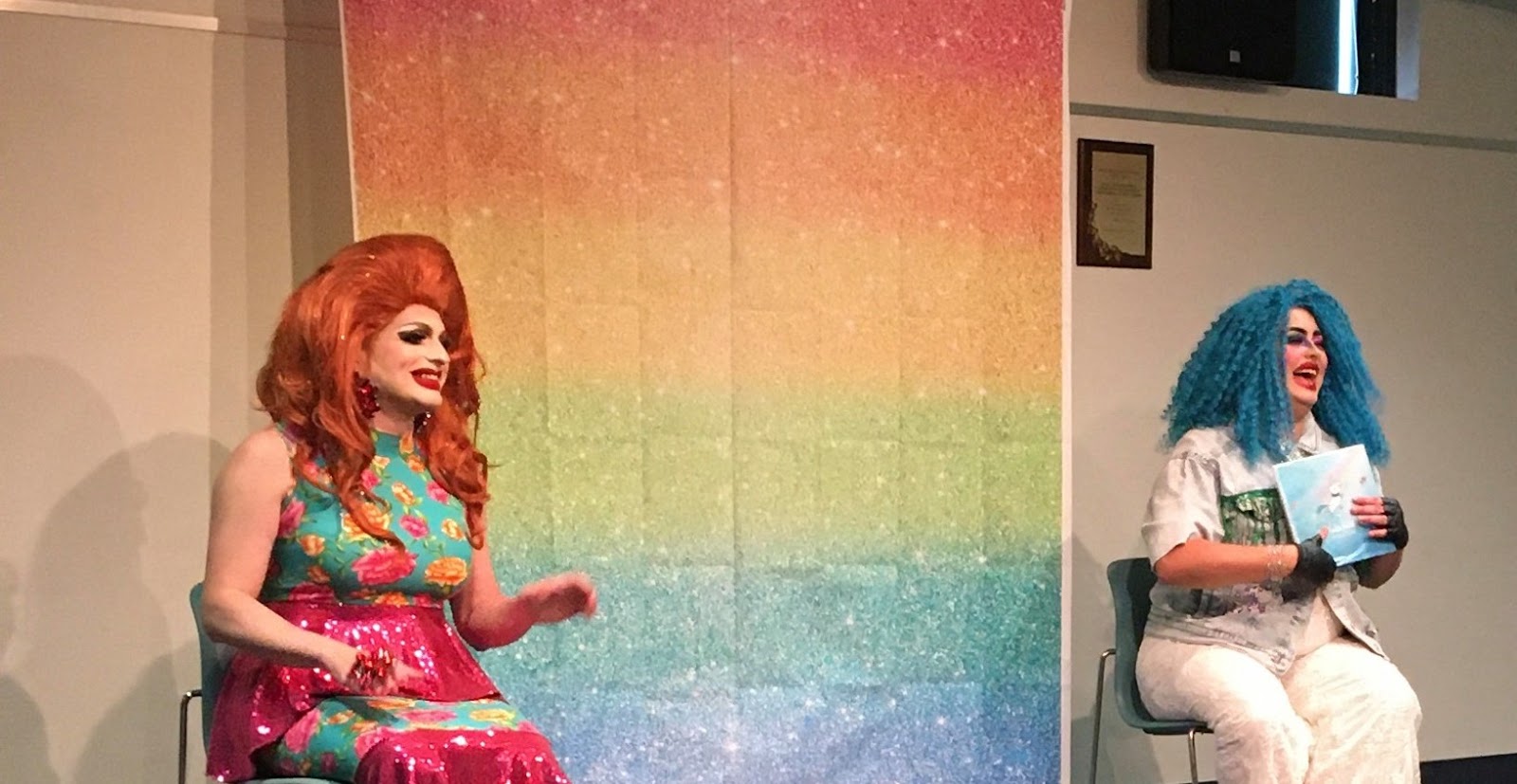
A jam-packed Drag Storytime, featuring local drag performers Ninny Nothin and Randi Xtra Xtra, took place at 11:00am and 1:00pm at West Warwick Public Library (WWPL) on June 26, 2021, to celebrate Pride and showcase the diversity of the community. Both events were full, with 70 parents, teens, and children attending each session.
Rashaa Al-Sasah, Head of Youth Services, and Emma Brelsford, Youth Services Librarian, organized and hosted the events. The two librarians worked with the drag artists to select age-appropriate materials to read during the program.
According to Al-Sasah, “The event went off without a hitch despite the pushback and protests of people who were opposed to the event taking place, with a majority of this [opposition] coming from outside of the West Warwick community.”
A great deal of planning was necessary for the day to run smoothly. “We planned in advance how we would have attendees enter the library and parking lot,” Al-Sasah said. “We had check-in points both at our parking lot and door as the library was not open for library services that day and [was open] only for this special event. This created and ensured a safe environment for all our patrons in attendance.”

Drag artists Ninny Nothin (left) and Randi Xtra Xtra (right)
Titles selected for storytime reading included Stick and Stone by Beth Ferry, Be Who You Are by Todd Parr, Not Quite Narwhal by Jessie Sima, and Peanut Goes for the Gold by Jonathan Van Ness. Each book is well known for themes of inclusion and acceptance. Songs were also used to engage the audience.
Books that were read during WWPL's Drag Storytime
Participants from within and outside the WWPL community were involved with staging the event and contributing to a safe and welcoming atmosphere. Volunteers from the LGBTQIA+ community support and empowerment groups Parasol Patrol and Free Mom Hugs were on hand to redirect attention away from protestors. A bubble machine provided further diversion. Attendees entering the library lobby were greeted by staff, and volunteers at tables represented community and health groups PFLAG of Greater Providence, Youth Pride, Inc. and Thundermist Health Center. Al-Sasah intentionally organized the lobby so that “parents and children could pick up information and swag and talk to representatives of the organizations,” learn about available resources, and make community connections on their way into the event.

Volunteers from Parasol Patrol
make themselves available outside the library
The audience greeted the drag performers with great enthusiasm and applause. In between the reading of each book, Al-Sasah and Brelsford joined the drag performers to lead a singalong to songs including “If You’re Happy and You Know It” and “The More We Get Together.” After Drag Storytime was over, attendees were invited to make a fairy wand craft and pose with the drag artists for photos.

Drag performers and WWPL staff lead the audience in a singalong
“It was a wonderful day with parents and children who were both LGBTQIA+ and allies who enjoyed listening to stories about friendship and being yourself,” said Al-Sasah.
WWPL staff reported that the drag performers “were very happy with the event, particularly [with] the care and measures” taken to ensure the safety and comfort of performers and attendees alike. Safety was of primary concern to Al-Sasah, particularly since “one of the performers was the center of a lot of online harassment” and “we wanted to make sure they knew they were safe.”
“We had a lot of positive reactions overall but there was some negative attention, in particular on social media,” Al-Sasah continued. “Two local Catholic priests were opposed to the event, [as were other] religious groups from outside of our community who sought to have the event canceled.”
Nevertheless, Al-Sasah is very happy with how the program went and felt that it “was certainly one of the highlights of my library career thus far to see all the happy kids and families thank us and the artists for telling them and their children to just ‘be who you are!’” The draw of the event has even resulted in newly devoted patrons to the library.

Volunteers from Parasol Patrol escort patrons to and from the building
Drag Storytime was an especially important event because “WWPL is committed to incorporating equity, diversity, inclusion, and justice into all our efforts and practices,” said Al-Sasah. “Working in West Warwick for several years, I found that we had a lot of LGBTQIA+ youth and families in our community [and] we didn't have any programs that were for our younger children. I thought this would be the perfect type of program for these kids and families to know they belonged and were welcome at the library.”
Al-Sasah continued, “We were thrown a lot of unexpected curveballs with the backlash but to us, this meant we were doing this for all the right reasons and [this] only further solidified our purpose in celebrating the diversity of our patrons.”
Will there be another Drag Storytime in West Warwick any time soon? “We certainly would love to host it again,” said Al-Sasah, “but have not made any plans just yet. But I would love to see more RI libraries host one, too!”
